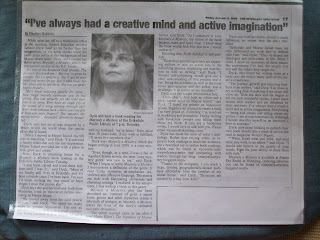Book: Never Knowing
Publisher: St. Martin's Griffin
Published: 2011
Book blurb: After months of research, Sara locates her birth mother -- only to be met with horror and rejection. The she discovers the devastating truth: Her mother was the only victim ever to escape a killer who has been hunting women every summer for decades. But Sara soon realizes the only thing worse than finding out about her father is him finding out about her.
Author bio: Chevy Stevens grew up on a ranch on Vancouver Island and still calls the island home. When she's not working on her next book, she's camping and canoeing with her husband in the local mountains.
Author web site: www.chevystevens.com
My review...
Feedback from a writer...
Chevy Stevens writes in the first person and the reader -- addressed as 'you' -- is also a character -- Nadina, a psychiatrist. This format allows Sara (the main character) to make personal comments about how the story is unfolding.
The book opens with Sara's address to the reader. It's like she's saying: Welcome, make yourself at home. This is my story.
The first chapter closes with Sara once again addressing the reader: Are you still there? Are you still interested? I hope so.
Stevens has a good grasp of when to show and when to tell. She seamlessly slips backstory into the story.
Favourite quotes...
'Like a metal to magnet I was sitting at my computer again.' (p. 34)
'[P]ulling his words over me like a soothing blanket.' (p. 41)
Character development of a minor character...
'Lauren is one of those rare people who are as nice as they look -- the kind of person who remembers what brand of shampoo you like and save the coupon for you.' (p. 24)
Good use of suspense...
'But I have a feeling something worse is waiting for me.' (p. 60)
A reader's comments...
Steven's comment on and invisible disability rang true for me (I have dyslexia and suffer from anxiety)...
'My entire life people have looked at me like I was faking it when I had a migraine. But I know how they hurt, how the pain almost makes you insane.' (p. 335)
For some reason, I didn't trust Sara's boyfriend. I thought he knew more than he let on.
I like how resourceful Sara was--she used small details she remembered about the man who was threatening her to outwit him.
Even though Sara did appear childish, at times, she was a devoted mother and a cunning advisory--unaware of her own strength.
Like another book I've reviewed--Wicked--Never Knowing explores the nature of evil.
'Knowing he wasn't all bad is a whole lot harder than believing he was pure evil.' (p. 439)
Even though I couldn't put the book down--even to the last page, I did find the ending drawn out.
There is a list of discussion questions at the end of this book. I found question 5 especially interesting.
'Do you believe in pure evil? Do you believe Sara's father was pure evil or was there any sense of humanity in him? Why or why not?'
Story lesson: If a person seems too good to be true, they are.









